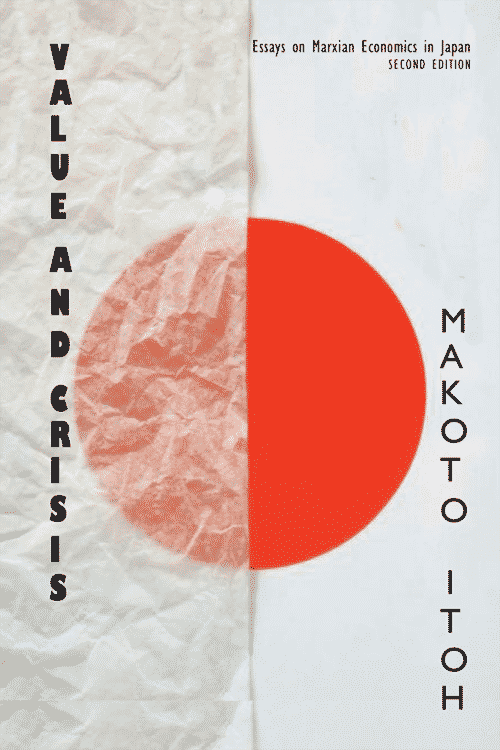Value and Crisis: Essays on Marxian Economics in Japan, second edition
By Makoto Itoh
296 pages / $29 paperback / 978-1-58367-898-5
Reviewed by Phil Armstrong for Counterfire
Makoto Itoh has had a long and distinguished career as a Marxist economist and is one of the leading thinkers of the Uno School of Marxism. He is one of a select group of Japanese scholars of Marx who have published widely in English, both in books and journals. One of his major concerns has been Marx’s value theory and the first edition of this book (1980) had a global impact on the field. Itoh is particularly well known for his collaborations with Costas Lapavitsas, especially their jointly authored work, Political Economy of Money and Finance (1999). This volume has been influential on my own thinking, especially on the nature and development of banking.i
Itoh divides this work into four parts. In the first, ‘Marxian Economics in Japan’, he begins by considering the significance of Marxism in Japan. He points out that the relative importance of Marx vis-a-vis the mainstream has been much greater in Japan than in the US and Europe, but expresses concern for the future as many of Japan’s leading Marxists are ageing in an environment characterised by falling university recruitment of Marxist economists. Itoh provides an introductory section on the history and development of Marxism in Japan which is very valuable and successfully sets the scene for narrative of the book. He looks at three epochs specifically, the pre-First-World-War period, the inter-war period and the post-war period and examines their notable characteristics, particularly with regard to developments in Marxist theorising.
Itoh introduces, compares and contrasts the development of the two most historically significant branches of Japanese Marxism, the ‘Rōnō-ha’ and ‘Kōza-ha’ schools. He then goes on to discuss the particular approach he favours, the ‘Uno’ school. This school follows from the work of Kōzo Uno (1897-1977); Itoh (pp.52-3 and p.58) notes that this is characterised first, by making a clear distinction between ‘socialist ideology’ and ‘Marxian economics as an objective social science’ and second, by a reliance on ‘stage-based’ analysis.ii This approach involves basic level research based on developing an understanding of the laws of motion of a capitalist economy; a second level which examines the historical stages of the development of capitalism, specifically, mercantilism, liberalism and imperialism; and a third level which considers the features peculiar to individual capitalist economies moving through historic time against a global economic backdrop.
Itoh also contrasts the development of Marxian economics in Japan with that of Western capitalist countries, noting that in the former, Marxian economists have been more able to develop an independent ‘scholarly tradition while concentrating on deepening Marxian economics itself’, whereas, in the latter, Marxists ‘have had to devote themselves far more to tackling the overwhelmingly dominant neoclassical tradition’….
….A fourth part, ‘Contemporary capitalism in crisis’, concludes the volume. The penultimate section of this part is the intriguing titled, ‘Spiral reversal of capitalist development: What Does it Imply for the Twenty-First Century?’ Here, Itoh argues convincingly, with the provision of evidence, that from the late nineteenth century, ‘the capitalist world system reversed the direction it took during the stage of liberalism in a spiral way, tending to restrict free market competition’ (p.225). However, Itoh then notes that there has been a ‘spiral historical reversal backward’, and that in the neoliberal period, ‘individualism and competitive freedom in the market order, not concerns for substantial economic equality or fraternity, have become the dominant ideology in the world’ (p.234). However, Itoh concludes on an optimistic note, arguing that this is not the end of the story and that nations can find alternative economic pathways to the US neoliberal model.
I certainly agree with this expression of the need for diversity and the presence of the potential to achieve it. Itoh concludes by considering the Japanese experience of the sub-prime crisis. After discussing the background to the crisis, Itoh contrasts the UK and US financial system, particularly its ‘originate-to-distribute credit through securities’ model with the Japanese (and German) ‘originate-to-hold’ approach. Under the influence of the so-called ‘Efficient Markets Hypothesis’ the former approach was considered superior. Such a view was based upon the – unfounded, from my perspective – assumption that markets can correctly price risk and were more ‘transparent, rational and efficient’ in allocating money funds than indirect banking credit that relies on personal relationships…’ (p.246).
Itoh argues that such a view is not supported by the evidence and, after a detailed discussion of the events of the period, goes further and argues that ‘neither the Japanese type of indirect finance, nor the US type of direct finance were able to prevent the disastrous swell and burst of huge bubbles’ (p.257). The author finishes with a call to arms, arguing that Marxist political economy can provide an alternative vision for the future and a platform on which to build an approach designed to enhance the quality of life for working people.
Makoto Itoh’s impressive knowledge and long experience as a Marxist economist allow him to produce this commendable work which combines detailed historical descriptions with thoroughly researched technical expositions. This work is a worthy addition to the literature and will be particularly appreciated by those unfamiliar with the history and contribution of Japanese scholarship of Marx. Itoh does not shy away from some of the key controversies involved in interpreting Marx’s work and this book thus provides a great opportunity, particularly for specialist scholars of Marx, to both widen and deepen their knowledge of Marx’ value theory and crisis theory. The extensive referencing is a treasure trove of potential pathways to further study and provides a great springboard for further research.
You can read the full review at Counterfire


Comments are closed.